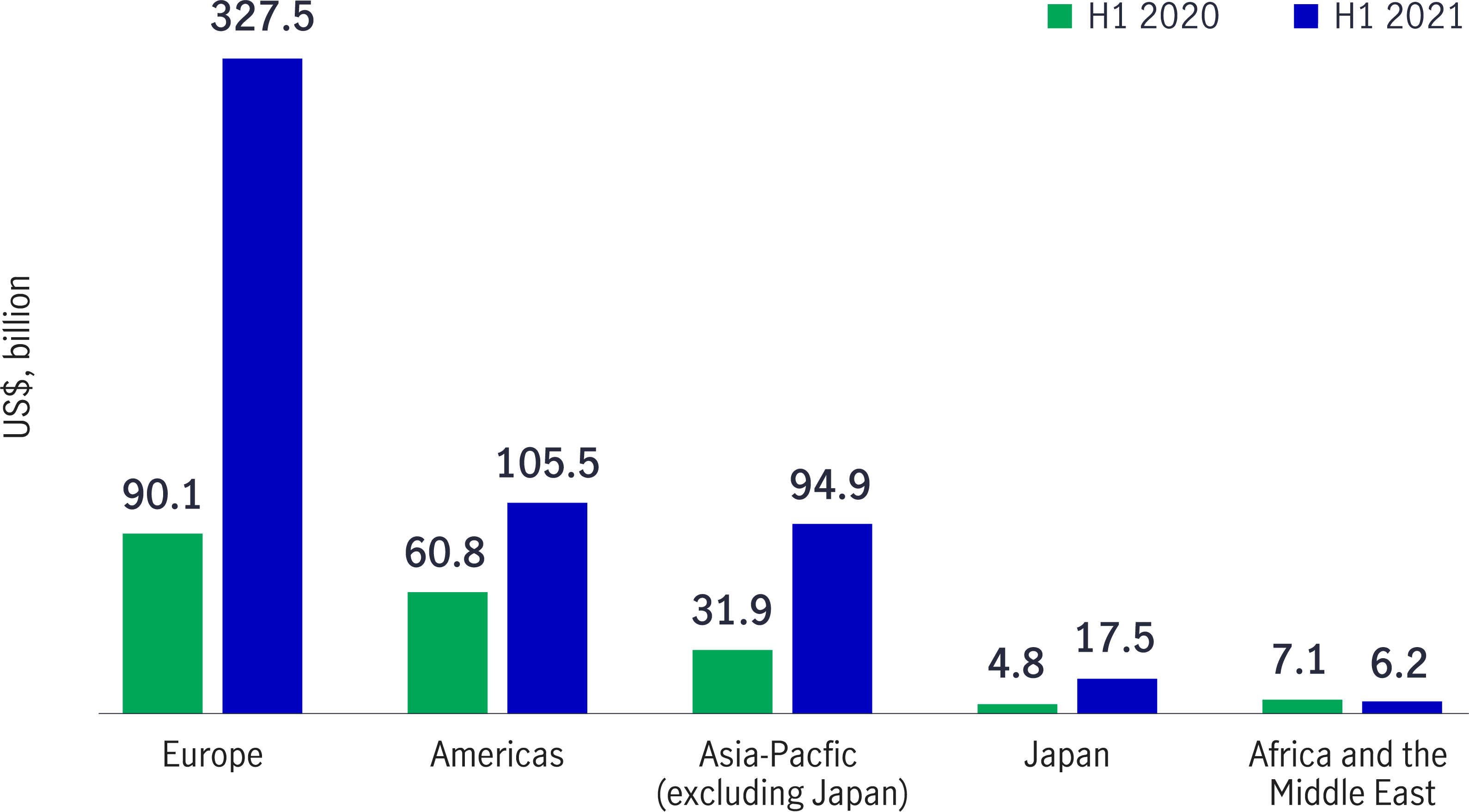24 November 2021
Murray Collis, Deputy Chief Investment Officer, Fixed Income, Asia ex-Japan
Eric Nietsch, CFA, Head of ESG, Asia


Investor interest in ESG investing is surging in Asia as seen by the rise in sustainability bond issuances. Asia is home to a diverse group of economies, each with its own set of challenges and opportunities. How can investors join Asia’s policymakers and companies to progress the sustainability agenda and capture the full extent of what’s possible?
If the amount of capital raised to fund sustainable projects in the first six months of 2021 could be viewed as a gauge of the progress that we’re making toward addressing sustainability issues, there could be cause for celebration. After all, global debt issuance related to environmental, social, and governance (ESG) objectives during the period surged 76% from a year ago to a record high of US$551.6 billion, accounting for nearly 10% of all debt issuance—a far cry from where we were just five years ago.¹
Unsurprisingly, Europe accounted for the lion’s share of total issuance (59.3%), with North America and Latin America together coming in at second place (19.1%). Encouragingly, issuance in the Asia-Pacific region (excluding Japan) in the first half of the year also grew, both in terms of share of new issuance and in value, to just under US$95 billion, or 17.2%1 (up from 16.4% in H1 2020²).
Sustainable debt issuance surges in the first half of 2021

Source: Refinitiv, Manulife Investment Management, July 2021.
These numbers are impressive in absolute terms, but they acquire additional significance when expressed as a percentage share of total fixed-income issuance in Asia over the first six months of the year; during this period, roughly one of every five debt issues in Asia can be classified as a sustainable bond issue. Using this metric, Asia charges to the top of the league table from a geographical basis, ahead of the Americas and Europe.
It’s fair to say that the rise in ESG bond issuance reflects a growing awareness of sustainability challenges among policymakers, corporates, and investors alike, particularly in the wake of the COVID-19 crisis.
This has been particularly true in Asia: A recent survey of 200 global institutional investors (representing roughly US$18 trillion in assets under management) showed that of the 70 or so respondents who are based in the Asia-Pacific region, 79% planned to increase their ESG allocation significantly or moderately in response to the pandemic.³ It’s difficult not to be heartened by the finding: For a region that’s been widely perceived to be behind the curve on the ESG front, it represents an important shift in investor mindset.
Crucially, we remain steadfast in our belief that Asia’s growing sustainability drive can unlock compelling investment opportunities for fixed-income investors. In this paper, we seek to outline key trends and developments in the region’s sustainable fixed-income market and provide the context within which these developments should be considered. Other topics featured include:
We discuss the importance of corporate engagements which provide a platform for investors to have an open dialogue with investee firms about their business models and strategies, including ESG challenges.
We also seek to illustrate how an active approach to ESG investing can not only help investors identify meaningful investment opportunities, but also facilitate important dialogues with key players (e.g., policymakers and investee firms) and bring us closer to our shared goal of creating a more sustainable future.
We also discuss how the basic principles of good investing can help investors combat greenwashing and distinguish genuine sustainability-related investment opportunities from, shall we say, less authentic ones.
We highlight some key learnings from our approach to evaluating and assessing sustainability opportunities.
1 “Sustainable finance review first half 2021,” Refinitiv, July 19, 2021.
2 “Sustainable finance review first half 2020,” Refinitiv, July 2020.
3 “Investment Insights 2021: Global Institutional Investor Survey,” MSCI, January 2021.
Q&A: The role of Asia-Pacific bonds in an investor’s portfolio
We look at Asian dollar bonds from a broader perspective and their role in downside protection.
Understanding the preferred securities market
Preferred securities occupy a unique niche in financial markets, blending elements of both debt and equity. In this Q&A, we explore the different types of preferred securities and delve into why their versatile nature makes them an attractive option across a wide range of market environments.
Beyond the hyperbole: three macro takeaways from the 2024 US elections
What investors and policy watchers should take away from the 2024 election results depends, in part, on time horizon.
Q&A: The role of Asia-Pacific bonds in an investor’s portfolio
We look at Asian dollar bonds from a broader perspective and their role in downside protection.
Understanding the preferred securities market
Preferred securities occupy a unique niche in financial markets, blending elements of both debt and equity. In this Q&A, we explore the different types of preferred securities and delve into why their versatile nature makes them an attractive option across a wide range of market environments.
Beyond the hyperbole: three macro takeaways from the 2024 US elections
What investors and policy watchers should take away from the 2024 election results depends, in part, on time horizon.